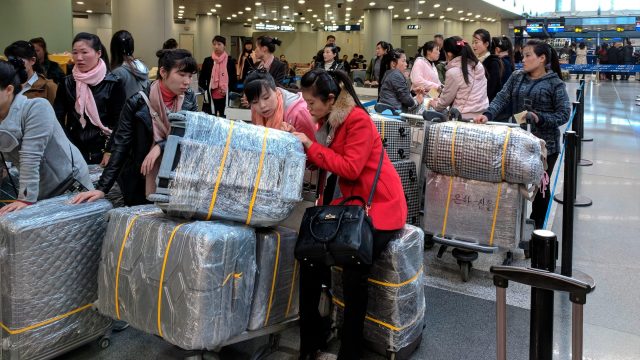
North Korea is often considered the most secretive nation on Earth, with the hermit state going to great lengths to conceal the inner workings of its authoritarian government. But while the country is infamous for not allowing its citizens beyond its borders, North Korea also sends many forced laborers overseas.
The country that benefits the most from North Korean workers is China, where a recent investigation from The New Yorker noted that many companies “rely on a vast program of forced labor from North Korea.” The country’s forced labor program reportedly began in the mid-2010s, and since then, “North Koreans have been sent to Russia, Poland, Qatar, Uruguay and Mali.”
The use of outsourced forced labor by North Korea, unlike most things surrounding the country, is well-documented. North Korean workers abroad supply a wide variety of products, from textiles and garments to seafood. And while the Covid-19 pandemic forced North Korea to shut its borders, North Korean leader Kim Jong Un has since “sent new batches of his workers overseas since relaxing pandemic border controls and launched a fresh crackdown on his people,” Bloomberg said. Despite North Korea’s secrecy, it appears that there is no end in sight to its workers being sent overseas — typically against their will.
What did the commentators say?
For North Korea, “renting out its workers to other countries allows the Kim regime to fund its prohibited nuclear and missile programs, as well as pay for imported luxury goods,” Anthony Ruggiero and Greg Scarlatoiu said for Foreign Policy. To siphon this money, North Korea “mandates that overseas workers’ salaries be deposited into government-controlled accounts, of which workers receive only a small fraction.”
While workers may covet these jobs at first, once they arrive overseas, they find that the jobs “come with a hidden cost,” Ian Urbina said for The New Yorker. Managers confiscate their passports and force them to sign multi-year contracts. At least 100,000 of these workers have been forcibly sent to China in recent years, according to sources from the U.S. State Department.
When it comes to the Chinese-North Korean work agreement, it is “sort of heavily regulated by the two governments” and is made up mostly of “women who get transferred into China for these jobs,” Urbina said to NPR. But the women often arrive “and what they’ve been promised they don’t receive. There are all sorts of hidden fees and then all sorts of abuses that occur at the factories,” Urbina said. He noted that reports of sexual assault were common among these forced laborers.
And while North Korea works to keep most aspects of its government secret, it appears to look the other way on keeping its forced labor in the dark given that “the number of workers sent abroad to raise money for the regime increased to tens of thousands, making billions of dollars a year,” Choe Sang-Hun said for The New York Times. Even though the United Nations has attempted to block nations from using North Korean labor, China, Russia and other likeminded countries have “become loopholes in enforcing the U.N. ban, helping the North earn badly needed cash as it deals with the fallout of international sanctions and the pandemic,” Choe said.
What next?
The United Nations has been trying for years to shut down North Korea’s overseas program. The organization has imposed sanctions and restrictions against the export of North Korean labor, as well as products that are commonly made using this labor. Some Western countries have also taken matters into their own hands — the United States, for example, has established a law prohibiting “any significant goods, wares, articles, and merchandise mined, produced or manufactured wholly or in part” by North Korean laborers from entering the U.S. The official stance of the United States is that, because of the country’s authoritarian regime, any labor by North Koreans should be regarded as forced labor unless proven otherwise.
The U.S. has also been “levying fines on companies that import goods tied to these workers,” The New Yorker said, and “China is supposed to enforce the sanctions in a similar manner.” Despite this, tens of thousands of North Korean forced laborers remain under contract in China, Russia, and elsewhere.
The hermit state commonly outsources forced labor to China, Russia and other countries






